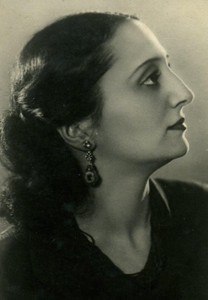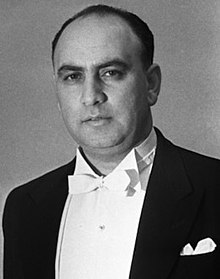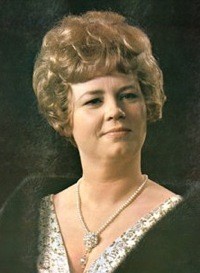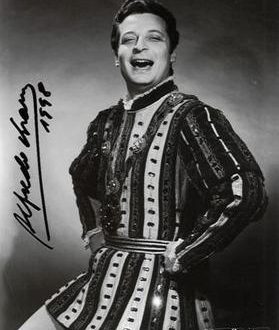
Zara Alexandrovna Dolukhanova |
Zara Dolukhanova

She was born on March 15, 1918 in Moscow. Father – Makaryan Agassi Markovich. Mother – Makaryan Elena Gaykovna. Sister – Dagmara Alexandrovna. Sons: Mikhail Dolukhanyan, Sergey Yadrov. Grandchildren: Alexander, Igor.
Zara’s mother had a voice of rare beauty. She studied singing with A.V. Yuryeva, a famous soloist, comrade-in-arms and friend of A.V. Nezhdanova in the past, and she was taught piano art by V.V. Barsova, very young in those years, in the future prima donna of the Bolshoi Theater. My father was a mechanical engineer, loved music, independently mastered the violin and piano, was a flutist in an amateur symphony orchestra. Thus, both daughters of talented parents, Dagmara and Zara, from the first days of their lives, existed in an atmosphere saturated with music, from an early age they were introduced to a genuine musical culture. From the age of five, little Zara began to take piano lessons from O.N. Karandasheva-Yakovleva, and at the age of ten she entered the children’s music school named after K.N. Igumnov. Already in the third year of study, under the guidance of her teacher S. N. Nikiforova, she played the sonatas of Haydn, Mozart, Beethoven, Bach’s preludes and fugues. Soon Zara moved to the violin class and a year later became a student at the Gnessin Music College, where she studied from 1933 to 1938.
In the musical technical school, her mentor was an outstanding master, who brought up a whole galaxy of famous violin laureates, Pyotr Abramovich Bondarenko, a professor at the Gnessin Institute and the Conservatory. Finally, sixteen-year-old Zara, having first joined two instrumental professions, found her main path. The merit in this is the chamber singer and teacher V.M. Belyaeva-Tarasevich. The teacher, relying on the natural and beautiful sounding chest notes, identified her voice as a mezzo-soprano. Classes with Vera Manuilovna helped the future singer’s voice to grow stronger, laid a solid foundation for further intensive development.
Zara’s years of study at the College of Music coincided with the heyday of the Russian composer and performing school. In the conservatory and the Column Hall of the House of Unions, along with domestic artists, foreign celebrities performed, masters of the older generation were replaced by young laureates, future associates of the singer. But so far, in the 30s, she did not even think about the professional stage and differed from her colleagues – novice students only in her greater efficiency and seriousness, indefatigable thirst for new experiences. Of the domestic singers, Zare in those years was closest to N.A. Obukhova, M.P. Maksakova, V.A. Davydova, N.D. Shpiller, S.Ya. Lemeshev. A recent instrumentalist, young Zara drew rich emotional impressions at the concerts of violinists, pianists, and chamber ensembles.
The professional development of Zara Alexandrovna, the growth and improvement of her skills were no longer associated with an educational institution. Without graduating from a technical school, she left for Yerevan for personal reasons – a meeting with Alexander Pavlovich Dolukhanyan, young, handsome, talented, love and marriage dramatically changed the usual life rhythm of an accurate, diligent student. The study was interrupted shortly before the final exams. Dolukhanyan took over the functions of a vocal teacher and convinced his wife of the preference for the family version of the “conservatory”, especially since he was a person who was highly competent in vocal and technological issues, who knew how and loved to work with singers, and besides, an erudite musician large scale, always convinced of his rightness. He graduated as a pianist from the Leningrad Conservatory, and in 1935 he also completed postgraduate studies with S.I. Savshinsky, the most authoritative professor, head of the department, and soon after his marriage he began to improve in composition with N.Ya. Myaskovsky. Already in Yerevan, teaching piano and chamber classes at the conservatory, Dolukhanyan gave many concerts in an ensemble with the young Pavel Lisitsian. Zara Alexandrovna recalls this period of her life, devoted to creativity, the accumulation of skills, as happy and fruitful.
Since the autumn of 1938 in Yerevan, the singer unwittingly joined the theatrical life and felt the hectic atmosphere of preparation for the decade of Armenian art in Moscow, worrying about her relatives – the forum participants: after all, a year before her marriage with Dolukhanyan, she married the rising star of the Armenian stage – baritone Pavel Lisitsian Dagmar’s older sister came out. Both families in full force in October 1939 went to Moscow for a decade. And soon Zara herself became a soloist of the Yerevan Theater.
Dolukhanova acted as Dunyasha in The Tsar’s Bride, Polina in The Queen of Spades. Both operas were conducted under the direction of conductor M.A. Tavrizian, a strict and exacting artist. Participation in his productions is a serious test, the first test of maturity. After a short break due to the birth of a child and spent with her husband in Moscow, Zara Alexandrovna returned to the Yerevan Theater, it was at the very beginning of the war, and continued to work on the opera parts of the mezzo-soprano repertoire. The musical life of the capital of Armenia at that time proceeded with great intensity due to the outstanding musicians evacuated to Yerevan. The young singer had someone to learn from without slowing down her creative growth. During several seasons of work in Yerevan, Zara Dolukhanova prepared and performed the part of Countess de Ceprano and Page in Rigoletto, Emilia in Othello, the Second Girl in Anush, Gayane in Almast, Olga in Eugene Onegin. And suddenly at the age of twenty-six – farewell to the theater! Why? The first to answer this enigmatic question, sensing the coming change, was Mikael Tavrizian, the chief conductor of the Yerevan Opera at the time. At the end of 1943, he clearly felt the qualitative leap made by the young artist in the development of performing techniques, noted the special brilliance of coloratura, new colors of timbre. It became clear that an already formed master was singing, who was waiting for a bright future, but hardly connected with the theater, rather with concert activity. According to the singer herself, chamber singing gave scope to her craving for individual interpretation and free, unrestricted work on vocal perfection.
Striving for vocal perfection is one of the main concerns of the singer. She achieved this primarily when performing works by A. and D. Scarlatti, A. Caldara, B. Marcello, J. Pergolesi and others. Recordings of these works can become an indispensable teaching aid for singers. Most clearly, the singer’s class was revealed in the performance of works by Bach and Handel. Zara Dolukhanova’s concerts included vocal cycles and works by F. Schubert, R. Schumann, F. Liszt, I. Brahms, R. Strauss, as well as Mozart, Beethoven, Stravinsky, Prokofiev, Shostakovich, Sviridov and others. Russian chamber music in the repertoire the singer devoted entire extended programs. Of the contemporary composers, Zara Alexandrovna also performed works by Y. Shaporin, R. Shchedrin, S. Prokofiev, A. Dolukhanyan, M. Tariverdiev, V. Gavrilin, D. Kabalevsky and others.
Dolukhanova’s artistic activity covers a forty-year period. She sang in the best concert halls in Europe, North and South America, Asia, Australia and New Zealand. In most of the largest music centers in the world, the singer gave concerts regularly and with great success.
The art of ZA Dolukhanova is highly appreciated in the country and abroad. In 1951, she was awarded the State Prize for outstanding concert performance. In 1952, she was awarded the title of Honored Artist of Armenia, and then, in 1955, the People’s Artist of Armenia. In 1956, Z.A. Dolukhanova – People’s Artist of the RSFSR. On February 6, Paul Robeson presented Dolukhanova with a Certificate of Appreciation awarded to her by the World Peace Council in connection with the tenth anniversary of the worldwide peace movement “For her outstanding contribution to the strengthening of peace and friendship among peoples.” In 1966, the first of the Soviet singers, Z. Dolukhanova, was awarded the Lenin Prize. In 1990, the singer received the honorary title of People’s Artist of the USSR. The unquenchable interest in her work is also evidenced by the fact that, for example, only in the period from 1990 to 1995, eight CDs were released by the firms Melodiya, Monitor, Austro Mechana and Russian Disc.
PER. Dolukhanova was a professor at the Gnessin Russian Academy of Music and taught a class at the Gnessin Institute, actively participated in the jury of music competitions. She has over 30 students, many of whom have become teachers themselves.
She died on December 4, 2007 in Moscow.





